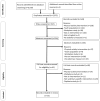Nonworksite Interventions to Reduce Sedentary Behavior among Adults: A Systematic Review
- PMID: 28993817
- PMCID: PMC5630153
- DOI: 10.1249/TJX.0000000000000036
Nonworksite Interventions to Reduce Sedentary Behavior among Adults: A Systematic Review
Abstract
Purpose: Sedentary behavior has been identified as a major health risk. While interventions to reduce time spent sedentary have become increasingly prevalent, the vast majority of this work in adults has been focused on workplace sedentary behavior, and often pairs sedentary reduction interventions with increasing physical activity. As research designed to specifically decrease sedentary time that is not limited to the workplace becomes available, identifying strategies and approaches, along with feasibility and efficacy of these interventions, is warranted.
Methods: Electronic databases were searched for sedentary interventions with eligibility criteria including: (a) interventions designed to explicitly reduce sedentary behavior that were not limited to the workplace, (b) outcomes specific to sedentary behavior, (c) adults aged at least 18 years, and (d) written in English.
Results: A total of 767 full-text manuscripts were identified, with thirteen studies meeting all eligibility criteria. While intervention characteristics and methodological quality varied greatly among studies, ten of the thirteen studies observed a significant reduction in objectively measured sitting time post-intervention. In those studies that collected participant feasibility/acceptability data, all reported that the intervention was viewed as "favorable to very favorable," would use again, and that participant burden was quite low, suggesting that these interventions were feasible.
Conclusion: Sedentary behavior interventions not limited to the workplace appear to be largely efficacious. While results varied with respect to the magnitude of the decrease in time spent sedentary, they are encouraging. However, due to the small body of evidence and the variability of study designs, our ability to make overarching statements regarding "best practices" at this time is limited. Well-controlled trials of longer duration with larger samples, using theoretically-based interventions with consistent prescriptions for limiting sedentary time are needed.
Keywords: adults; behavior change; health promotion; sitting.
Figures
Similar articles
-
Randomized controlled pilot of an intervention to reduce and break-up overweight/obese adults' overall sitting-time.Trials. 2015 Nov 2;16:490. doi: 10.1186/s13063-015-1015-4. Trials. 2015. PMID: 26525049 Free PMC article. Clinical Trial.
-
Effectiveness of interventions for reducing non-occupational sedentary behaviour in adults and older adults: a systematic review and meta-analysis.Br J Sports Med. 2019 Oct;53(19):1206-1213. doi: 10.1136/bjsports-2017-098270. Epub 2018 Jan 13. Br J Sports Med. 2019. PMID: 29331992
-
The effect of weight management interventions that include a diet component on weight-related outcomes in pregnant and postpartum women: a systematic review protocol.JBI Database System Rev Implement Rep. 2015 Jan;13(1):88-98. doi: 10.11124/jbisrir-2015-1812. JBI Database System Rev Implement Rep. 2015. PMID: 26447010
-
Organizational Culture and Implications for Workplace Interventions to Reduce Sitting Time Among Office-Based Workers: A Systematic Review.Front Public Health. 2018 Sep 24;6:263. doi: 10.3389/fpubh.2018.00263. eCollection 2018. Front Public Health. 2018. PMID: 30320051 Free PMC article.
-
Perceptions of the acceptability and feasibility of reducing occupational sitting: review and thematic synthesis.Int J Behav Nutr Phys Act. 2018 Sep 18;15(1):90. doi: 10.1186/s12966-018-0718-9. Int J Behav Nutr Phys Act. 2018. PMID: 30227861 Free PMC article. Review.
Cited by
-
Benefits of 8-wk Mindfulness-based Stress Reduction or Aerobic Training on Seasonal Declines in Physical Activity.Med Sci Sports Exerc. 2018 Sep;50(9):1850-1858. doi: 10.1249/MSS.0000000000001636. Med Sci Sports Exerc. 2018. PMID: 30113538 Free PMC article. Clinical Trial.
-
Efficacy, characteristics, behavioural models and behaviour change strategies, of non-workplace interventions specifically targeting sedentary behaviour; a systematic review and meta-analysis of randomised control trials in healthy ambulatory adults.PLoS One. 2021 Sep 7;16(9):e0256828. doi: 10.1371/journal.pone.0256828. eCollection 2021. PLoS One. 2021. PMID: 34492051 Free PMC article.
-
A protocol for a systematic review of process evaluations of interventions investigating sedentary behaviour in adults.BMJ Open. 2019 Sep 18;9(9):e031291. doi: 10.1136/bmjopen-2019-031291. BMJ Open. 2019. PMID: 31537573 Free PMC article.
-
Interventions outside the workplace for reducing sedentary behaviour in adults under 60 years of age.Cochrane Database Syst Rev. 2020 Jul 17;7(7):CD012554. doi: 10.1002/14651858.CD012554.pub2. Cochrane Database Syst Rev. 2020. PMID: 32678471 Free PMC article.
-
Lessons and Untapped Potential of Smartphone-Based Physical Activity Interventions for Mental Health: Narrative Review.JMIR Mhealth Uhealth. 2024 Mar 15;12:e45860. doi: 10.2196/45860. JMIR Mhealth Uhealth. 2024. PMID: 38488834 Free PMC article. Review.
References
-
- Aadahl M, Linneberg A, Moller TC, et al. Motivational counseling to reduce sitting time: A community-based randomized controlled trial in adults. Am J Prev Med. 2014;47(5):576–86. - PubMed
Grants and funding
LinkOut - more resources
Full Text Sources
Research Materials

